Related Research Articles
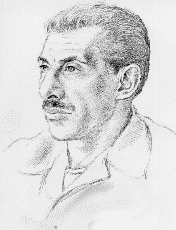
Idries Shah, also known as Idris Shah, Indries Shah, né Sayed Idries el-Hashimi and by the pen name Arkon Daraul, was an Afghan author, thinker and teacher in the Sufi tradition. Shah wrote over three dozen books on topics ranging from psychology and spirituality to travelogues and culture studies.
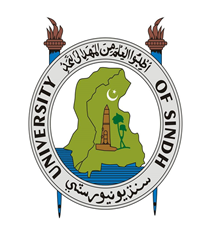
The University of Sindh is a public research university in Pakistan located in the city of Jamshoro. It is one of the oldest universities in Pakistan and was certified by ISO in 2015.
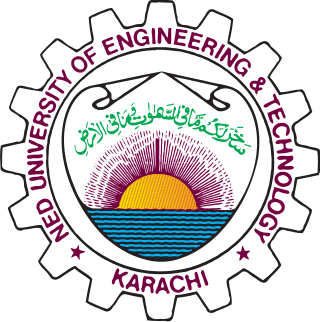
The NED University of Engineering & Technology is a public university located in the urban area of Karachi, Sindh, Pakistan. It is one of the oldest and best engineering universities in Pakistan, acknowledged for its best teaching practices and graduates.

Mehran University of Engineering & Technology is a public research university located in Jamshoro, Sindh, Pakistan focused on STEM education.

Abia State University Uturu (ABSU) is a Nigerian public university. It is one of the state-owned universities in Nigeria. These state academic institutions were created to expand admissions and bring professional skills, expertise and modern research facilities close to the city and rural dwellers, and have helped talented students to obtain higher education.
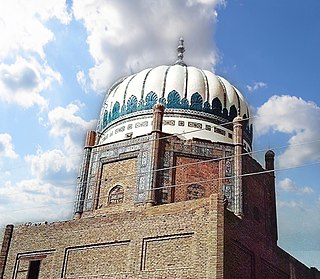
Hala is a city and taluka of Matiari district of Sindh, Pakistan. According to the Revenue record, Hala was given the status of Taluka of Hyderabad District in 1848. In 2005, it became part of Matiari District. Hala is located on the N-5 National Highway of Pakistan at a distance of about 62 kilometers from Hyderabad. Hala is also located on the Tando Adam - Mehrabpur Railway Line but railway line has been abandoned by Pakistan Railways. As of 2017 census, the Hala Municipal Corporation has a population of 65,731. Total population of Hala Taluka is 262,423 (2017) which includes Hala Municipal Corporation, Hala Old, Bhit Shah, Bhanote and surrounding areas.
The Ziauddin University ; abbreviated as ZU) is a private university located in Karachi, Sindh, Pakistan. The university is named after the educationist, Ziauddin Ahmad.
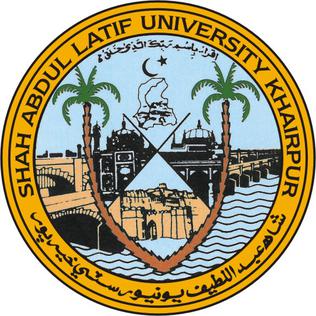
Shah Abdul Latif University, is a public research university in Khairpur, Pakistan. The university is named after the mystic poet and spiritualist Shah Abdul Latif Bhittai.
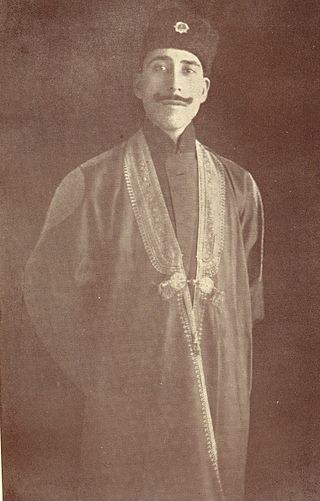
Sirdar Ikbal Ali Shah was an Indian-Afghan author and diplomat descended from the Sadaat of Paghman. Born and educated in India, he came to Britain as a young man to continue his education in Edinburgh, where he married a young Scotswoman.
Nabi Bakhsh Khan Baloch was a Sindhi research scholar, historian, sindhologist, educationist, linguist and writer. He predominantly wrote in Sindhi, including Urdu, English, Persian and Arabic. He has been described as the "moving library" of the Pakistani province of Sindh.

The University of Burdwan is a public collegiate state university located in Purba Bardhaman, West Bengal, India. It was established by the West Bengal Government as a teaching and affiliating university on 15 June 1960 with six graduate departments and 30 undergraduate colleges spread over three districts that come under the jurisdiction of the university. The university currently offers more than 30 undergraduate and 66 postgraduate courses.

Dayaram Jethamal Sindh Government Science College, commonly known as DJ Science College, is a public community college that is affiliated with the Board of Intermediate Education Karachi and the University of Karachi — it is located near Burns Road in Karachi, Sindh, Pakistan.
International Association of Sufism (IAS) is a California nonprofit organization headquartered in Marin County. It is a United Nations' NGO/DPI and the first organization established to organize an inclusive forum that opens a line of communication among Sufis all around the world. IAS launched a global intra-faith movement among Sufis and Sufi Schools.
Riyaz Punjabi was a professor and vice chancellor at the University of Kashmir. He was granted the Padma Shri, one of India's highest civilian awards, in 2011. In 2008 he was granted an honorary professorship at the International University Vienna for his contribution in "Strengthening International Relations in the Sphere of Education". He also won the Amity Academic Excellence Award from Amity International Business School, in 2009, the Fazil Memorial Award in 2009, and the Adbi Markaz Kamraz award in 2010. He died on April 8, 2021.

Shah Inayatullah, popularly known as Sufi Shah Inayat Shaheed, Shah Shaheed or Shah Inayat of Jhok, was a 17th-century Sindhi Sufi saint and revolutionary from Jhok. He was the first socialist and agricultural reformist of Sindh.
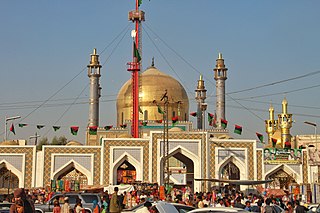
Sufism in Sindh covers the tradition of Sufism in Sindh, which is reputed to be an area of mystics. Sindh is famous for the enormous number of saints and mystics who lived there and preached peace and brotherhood. According to popular legend, 125,000 of them are buried on Makli Hill near Thatta. There is an abundance of Sufi literature produced in Sindh throughout history.

Sufism known as Tasawwuf in the Arabic-speaking world, is a form of Islamic mysticism that emphasizes introspection and spiritual closeness with God. It is a mystical form of Islam, a school of practice that emphasizes the inward search for The God and shuns materialism. About 60% Muslims in Pakistan regard themselves as followers of Sufi saints.
Michel Boivin is a French historian and anthropologist who specializes in South Asia. Trained in contemporary history, Islamic studies and ethnology, he is currently Emeritus Director of Research at the Centre national de la recherche scientifique and a member of the CESAH, former CEIAS at the School for Advanced Studies in the Social Sciences (EHESS). He had taught at the Université de Savoie Mont Blanc, at Sciences Po Lyon, as well as at The Catholic University of Lyon. He has co-directed three seminars at the EHESS: "History and Anthropology of the Muslim Societies of South Asia", "Authority and Politics in the Sufism of South and Central Asia", and "Material Culture and devotion among the Shia societies". In addition, he contributed to the organization of two CEIAS research groups: "Vernacular Cultures and New Muslim Elites", with Julien Levesque, and "Gujarati and Sindhi Studies: Societies, Languages and Cultures", with Pierre Lachaier.

Hotchand Molchand Gurbakhshani was an educationist and scholar, renowned for his annotated translation of the Sufi poetic compendium Shah Jo Risalo. He held the position of Principal at D.J. Sindh College Karachi and served as the first president of the Sindh Historical Society.
Syed Ghulam Mustafa Shah [(Sindhi: سيد غلام مصطفيٰ شاھ), 18 October 1918 - 09 October 1999] was a scholar, educationist and academic leader from Sindh, Pakistan. He served as Vice Chancellor of Sindh University Jamshoro and Federal Education Minister of Pakistan. He was founder of "Shah Abdul Latif Cultural Society" and launched the scholarly Journal "Sindh Quarterly".
References
- ↑ "Nomenclature: Assembly approves new name for SU". The Express Tribune. March 8, 2015.